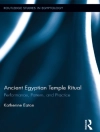Impostors and impostures featured prominently in the political, social and religious life of early modern England. Who was likely to be perceived as impostor, and why? This book offers the first full-scale analysis of an important and multifaceted phenomenon.
Tobias B. Hug examines a wide range of sources, from judicial archives and other official records to chronicles, newspapers, ballads, pamphlets and autobiographical writings.
This closely argued and pioneering book will be of interest to specialists, students and anyone concerned with the timeless questions of why and how individuals fashion, re-fashion and make sense of their selves.
İçerik tablosu
Contents
Acknowledgments
Abbreviations
Introduction
Part I
Identifying impostures in early modern England
1 Counterfeit beggars, bogus cunning folk and bigamists
2 Tricksters and officialdom – bogus officials and forgers
3 Quacks – all notorious medical impostors?
4 Prophets and visionaries, possessed and exorcists – all religious impostors?
5 ‘The unfortunate whose kingdom is not of this world’ – political impostures
6 Ethnic impostors
Counterfeit Egyptians
7 Gentleman impostors
Part II
Imposture and autobiography
8 The self-representation and self-perception of William Fuller (1670-1733)
Conclusion
Bibliography
Yazar hakkında
Anthony Milton is Professor of Early Modern British History at the University of Sheffield












